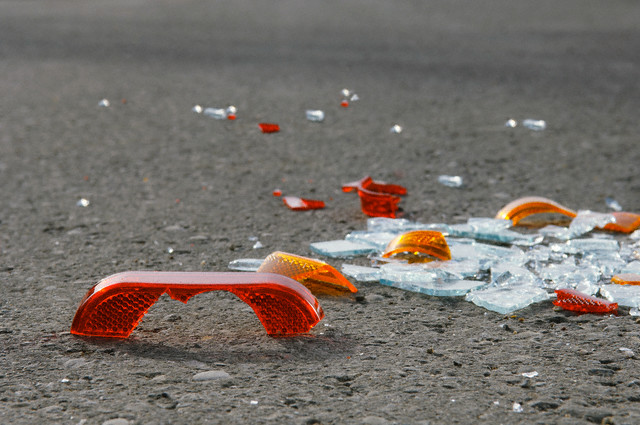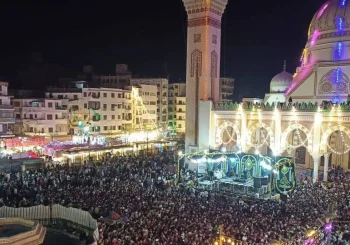Each year, thousands of road accidents across Egypt cause serious injuries for some and reap the lives of others. In 2014, the Central Agency for Public Mobilization and Statistics (CAPMAS) recorded a total of 14,403 road accidents which claimed the lives of 6,226 people and led to the injury of 24,154 others – meaning an average of 17 people die on Egyptian roads per day.
Last April, my mother and I were yet another two additions to the 2015 toll of accidents. But what was even more frightening than the accident was how little value our well being and safety had amid the corruption which proved to overrule the law.
On our way back from Alexandria to Cairo, my mother and I, along with the family driver, had just left the rest house doing a steady 90 km/hour on the Desert Road when the accident occurred. Ten minutes into our journey, another car speeding at 170 km/hour crashed into the back of ours causing us to drift off the road and crash straight into the concrete blocks on the side of the road.
The impact left the front and back of the car in ruins. My mother had flipped over by the time the car came to a halt, with her back to the front window and her body lodged between the two front seats, the drivers face and chest squeezed into the air bags and my foot wedged between the front seat and the car’s floor.
Having managed to safely pull ourselves out of the car, we stood on the side of the road trying to absorb what had just happened, and figure out what needs to be done. Eventually, people started pulling over to come to our aid.
We soon learned that the other car was driven by a young police officer who had his wife and daughter with him. The women were both transported to the hospital, with injuries from the crash.
Standing in the middle of the Desert Road, we waited for authorities to come. Meanwhile, the people around us reassured us that it wasn’t our fault.
“I saw the man coming all the way from the beginning of the road, driving like a crazy man! It’s not your fault, I saw it all!” one man said.
“Would you testify in court?” we asked him.
“I can’t,” he claimed, “that car you hit was driven by a police officer – if I testify I’ll be behind bars tomorrow.”
Although the car may have hit us bad, reality hit us even worse; you fear the people that are supposed to be protecting you in this country.
Such incidents don’t seem odd knowing that on the Corruption Perceptions Index, Egypt has scored 37 as of 2014 (with 0 being the most corrupt and 100 being the least), rising from 32 in both 2013 and 2012.
According to the 2014-2015 World Economic Forum (WEF) report, the police are perceived by public opinion as one of the most corrupt institutions of the country, with 80 percent of respondents to Transparency International’s Global Corruption Barometer (GCB) saying that the police are corrupt or extremely corrupt.
“Almost 40 percent of those who had encountered the police in the past twelve months said they had to pay a bribe,” adds the WEF report. “Petty corruption is widespread within the police and firms see the institution as unreliable and impartial.”
Given the status quo, many citizens often find themselves obliged to play by the rules of a corrupt system.
Having realized that the young police officer -who had hit us- will likely use his position to his advantage, my mother decided to play it the same way herself.
Through my uncle, my mother was able to reach a distant relative who occupies a powerful position within the police force.
Upon the arrival of a police officer to intervene, he began inquiring about the incident and our family background. Naturally, everything was made a lot easier after we informed him of our connection. The least guarantee this gave us was that the officer who hit us wasn’t going to simply get off the hook.
After finding a lift back to Cairo, both drivers involved in the car crash were sent to the police station. Aware that he was mistaken and that he no longer had the upper hand, the other driver offered to pay half the costs of fixing our car.
But it wasn’t long before the other driver’s lawyer showed up asking him to change the statement which he had made. The lawyer urged his defendant to claim we had intervened in his lane, causing the car crash.
Nepotism is quite prevalent in Egyptian society, a sad fact, but at times the one thing you can resort to. When you’re in the middle of a highway, your car in ruins, and your loved ones looking for a way home or out of a mess – you’re not really going to be thinking about right or wrong just about how the system works in Egypt.
The one thing I kept thinking about was that if this system was different and it didn’t matter where you came from or who you knew, nobody would have to, or even be able to resort to that. You would get the same treatment – no matter what.
If people were more worried about the laws than by the people controlling them, maybe they’d have respect for regulations. Maybe they would be careful if they felt that a badge and a title aren’t going to help them in a serious situation. Maybe people would stop being above the law.







Comments (21)
Have you sent this to Sisi’s email account? I was a passenger in a rearender about 2 months ago. Our friend was driving. The driver of the car that hit us immediately called a cop friend of his who showed up pretty quick. No one was badly injured but there were little kids in his car with no seat belts sitting on granny’s lap and the wife in front. Life comes cheap in Egypt. People have no sense of safety for their passengers or the other drivers. The police do little about it. They rarely stop speeders nor do they ticket families of 5 on motorcylces. Until the traffic police start doing more than checking registration and license at checkpoints this will not end. And now with all the new roads being built we can expect to see more of this kind of thing.
Completely agree Carole. There is something very abnormal in the brain of Egyptians who think driving without seat belts and with kids jumping around the seats is okay etc etc etc .
In Canada a traffic cop stopped an Egyptian who was reversing up a highway. They send him for a psychiatric report for the court case. In Egypt no one would even think this was a problem. There is something clinically or psychologically wrong with the minds of many Egyptians when you see the things they do.
About a month ago I watched a guy come out the mosque get in his car and his two 7-10 year old sons sat on the BONNET/HOOD of the car and the father just pulled out the side street at the mosque and speeded down the main road in front of my eyes. No one batted an eye lid.
don’t go to Egypt period the people are brainless and I don’t think they built the pyramids no beauty in them no sense no honour idiots
cos hes on kawkabi maajoun
This not fair for the people od egyptian, today. unless you drive safe no one safe in the land